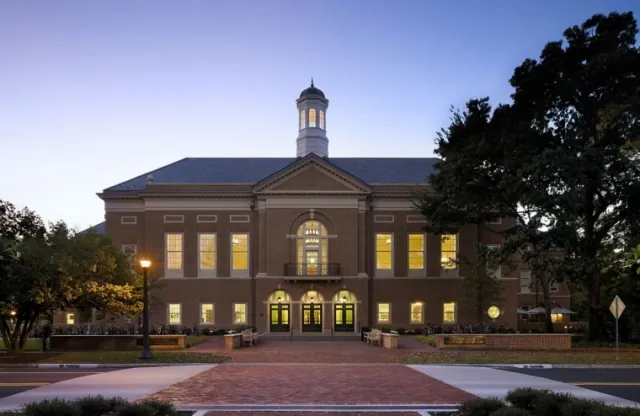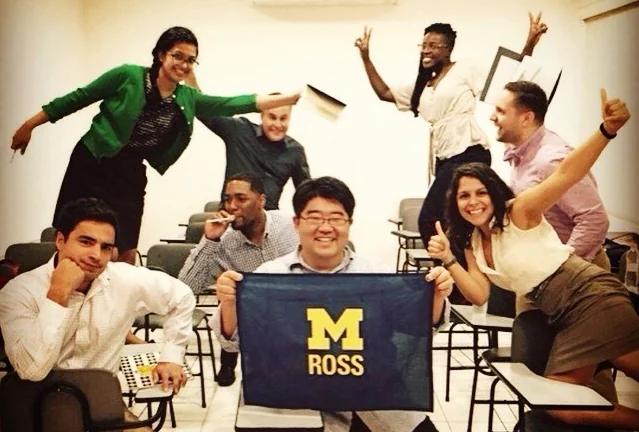College of William & Mary, Mason School of Business
Looking for a business school with momentum on its side? You may want to pay a visit to Williamsburg, home of the Mason School of Business. Unranked by P&Q just two years ago, Mason debuted at #20 in 2017 before climbing to 12th last year.
The school’s secret? Happy students.
As a whole, the College of William & Mary boasts the happiest students according to a 2018 poll conducted by the Princeton Review. It is a “one tribe, one family” atmosphere according to survey respondents, where faculty “love teaching” and there is “always something going on.” In fact, the college is sometimes described as a “public Ivy,” one where the experience is “not just for grades or jobs but [for] developing and satisfying your curiosity.”
This spirit carries over into the Mason School. In P&Q’s alumni survey, the business program ranked 4th in college experience with a 9.37 score on a 10 point scale – just .02 of a point behind 2nd-place Boston College. In terms of overall satisfaction, Mason placed 2nd with a 9.49 average – only .04 of a point behind Notre Dame. As a whole, the school’s average scores in the survey jumped from 9.01 to 9.49 over the past year – nearly a point higher than the 8.64 average among all schools.
Where were Mason students the happiest? According to the alumni survey, Mason ranked as the top business school for quality of teaching, faculty availability, faculty mentoring, and developing skills. It also finished as the runner-up in career advising, academic advising, career preparation, and landing a dream job. In the all-important question – Would you recommend Mason to a friend or colleague – 90% said they would, the 4th-best rate of any business school.
Here are two more numbers to consider: 95% of the 2018 class landed jobs within three months of graduation. That same 95% rate applies to something else: the percentage of alumni who are now working in their desired company and job function.
No wonder Mason alumni only have good things to say about their alma mater!
Another reason is that Mason doesn’t demand that students walk lock-step with their peers. Instead, students create an Individual Study Plan, mixing business foundations with personal passions to create a custom experience that fits their long-term plans. Flexibility isn’t the only thing that distinguishes Mason. One popular tradition is Simulation Week, which students spend opening and operating a business through a simulator. Here, their decisions can make-or-break their venture, as they wrestle with variables like target markets and pay and benefits for employees. Students even write an annual report to boot!
Indeed, William & Mary is America’s second-oldest university, tracing its lineage back to the 17th century. True to its roots, Mason has excelled in fostering a small school experience that balances students’ individual ambitions with their need for a supportive community around them. It may take a village to raise a child, but it takes a Tribe to inspire catalysts and develop leaders. That is Mason’s mission – and they do it better than almost any other school.
University of Michigan, Ross School of Business
What’s the only thing worse than being the runner-up? It is finishing 4th – being on the outside looking in, overlooked and taken for granted.
That wasn’t the case with the Ross School of Business. In P&Q’s 2018 undergraduate business school ranking, Ross made everyone take notice, vaulting from 13th to 4th, buoyed by higher alumni satisfaction scores. Here, Ross’ rank rocketed from 32nd to 11th across all categories, going from an 8.83 average to a 9.23 on a 10-point scale. The school’s strengths according to alumni? That came in career advising, skill development, and socioeconomic improvement.
At the same time, the program ranked among the five best for inputs (admissions criteria) and outputs (pay and placement). With the former, just 12% of applicants are accepted into the undergraduate business program. Among those who do, the average SAT and ACT scores is 1470 and 3.3 respectively, with 82.2% ranking among the top 10% of their high school classes. Once these students graduate, the possibilities are endless. 97% land jobs within 90 days of graduation. That includes the 40% who venture out to the Big Apple – no surprise there considering 40% of the 2018 Class accepted positions in finance. 2018 Ross grads also grossed $78,165 to start, up over $1,000 over the previous year (with the percentage of students receiving signing bonus rising by 7% as well).
Hiring new graduates is always a risk. At Ross, the program mitigates that risk with a hands-on curriculum that produces grads who possess extensive experience beyond reading cases and drafting papers. Here, students can engage in a wealth of activities that expose them to the daily demands of their fields. For example, in the Living Business Leadership Experience, student teams run an actual business unit on behalf of a business partner. They are not only exposed to the various organizational roles, but also how various functions impact each other. The curriculum also includes several courses where students can launch their own business, operate investment funds, or conduct consulting projects on behalf of Fortune 500 powerhouses and non-profit services alike. The programming even culminates with a capstone experience, where students apply everything they learn in a project for a sponsoring company.
Decades ago, Ross was already a pioneer in this learning-by-doing model, infuses it across every class. The school calls it REAL, as in Ross Experiences in Action-Based Learning. It is a distinctive way of learning business, one that sticks because concepts come to life in context. Instead of the proverbial ‘chalk and talk,’ students are engaged in activities, one where they can see their own impact – all while being held accountable for the results.
“Ross offered multiple hands-on, capstone courses focused on real world business problems,” says one 2016 alum. “Most pivotal for me was a capstone course focused on acting as a client serving consultant for both local and large companies. Specifically, I was able to work directly with P&G to assist in a marketing campaign. My team was engaged as if we were true consultants and held weekly status meetings with the client, as well as an end of semester deliverable.”
Such activities have also produced a rather proactive class culture, one defined by students tackling forward-thinking issues ranging from launching a crypto trading club to establishing a national nonprofit centered around medical and recreational marijuana. Question is, what can Ross do for an encore. When the arrows pointing upwards across the board, you may find Ross’ 4th place turning into 2nd – or even better!













Questions about this article? Email us or leave a comment below.